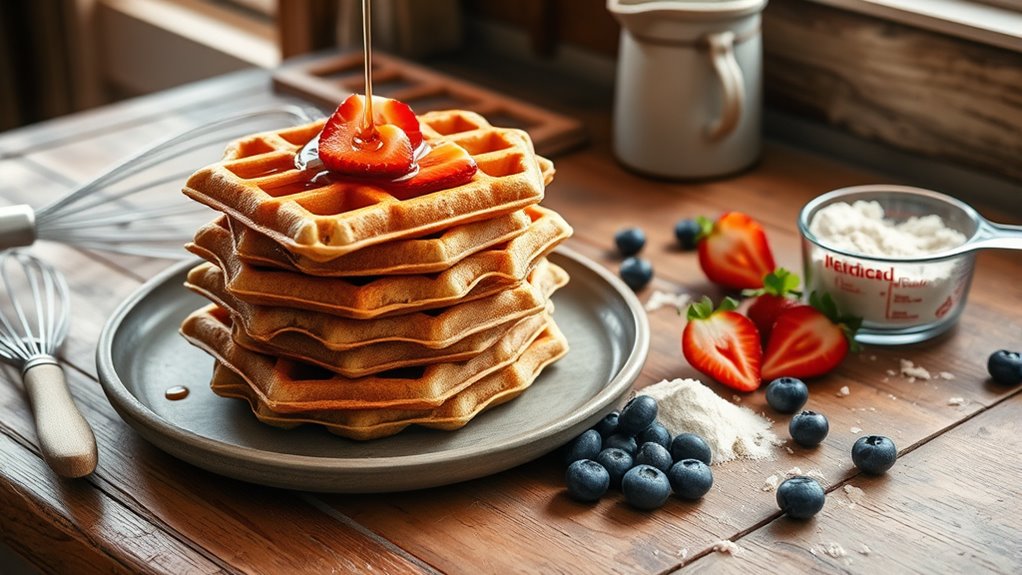To make perfect whole grain waffles, start by measuring 1 ½ cups of whole wheat flour and ½ cup of rolled oats for fiber and nutrients. Sift dry ingredients and whisk wet ingredients separately before gently mixing to avoid toughness. Preheat your waffle iron fully, pour in batter without overflow, and cook until steam stops escaping. Serve warm for the best texture and flavor. Follow these steps carefully, and you’ll soon discover tips to enhance both taste and health benefits.
Ingredients and Quantity
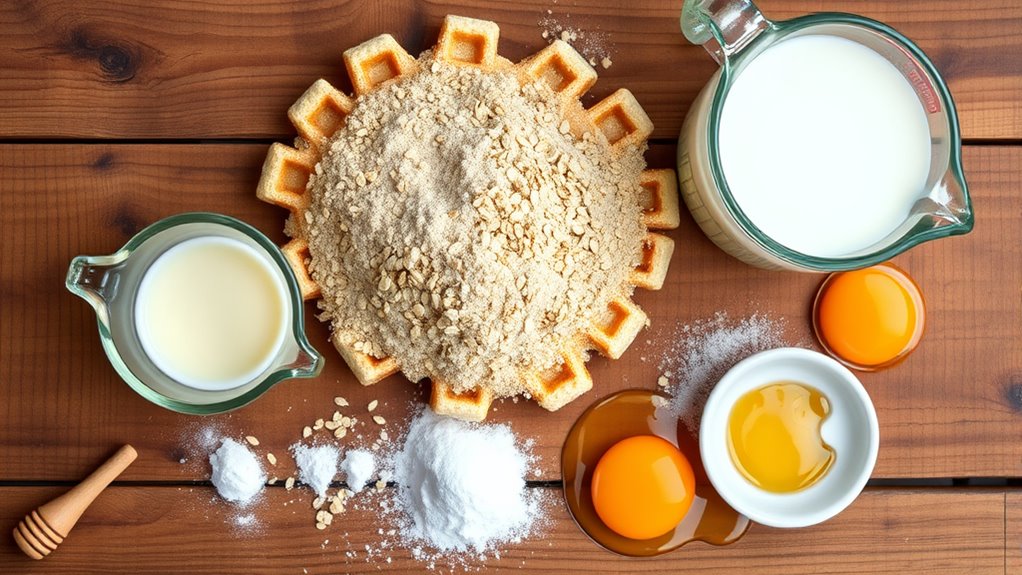
To make perfect whole grain waffles, you’ll need a precise combination of ingredients that balance flavor, texture, and nutrition. Whole grains are essential here, offering superior nutritional benefits such as fiber, vitamins, and minerals. Using the right quantities guarantees your waffles are moist yet crispy, providing a satisfying bite without sacrificing health.
| Ingredient | Quantity | Nutritional Benefit |
|---|---|---|
| Whole wheat flour | 1 ½ cups | High fiber, supports digestion |
| Rolled oats | ½ cup | Rich in antioxidants and fiber |
| Baking powder | 2 tsp | Leavens for light texture |
This combination empowers you to enjoy waffles that nourish your body while granting freedom to savor whole grains.
Preparations
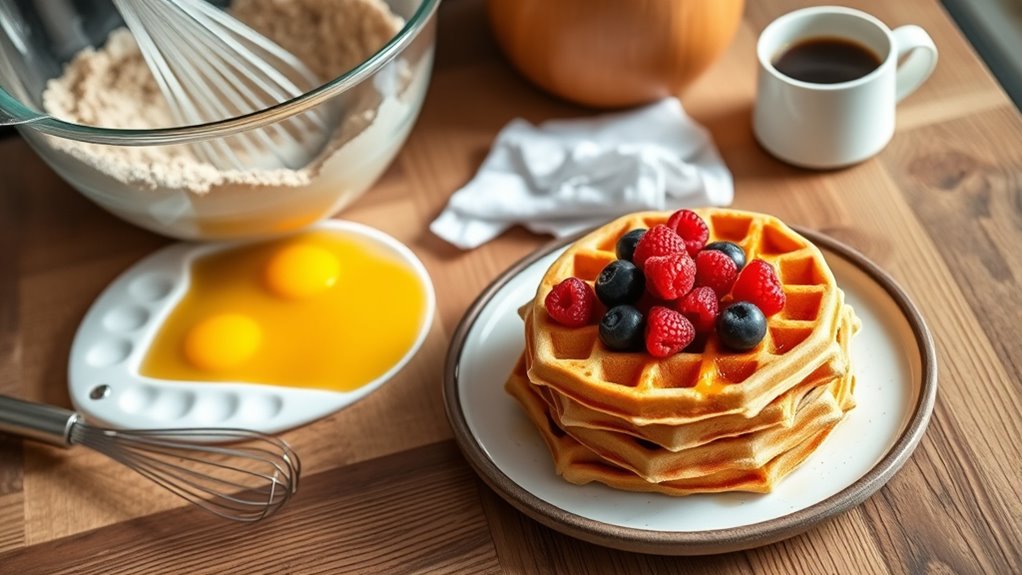
Now that you’ve gathered the right ingredients in the proper amounts, preparing them correctly will set the foundation for your whole grain waffles. Pay attention to mixing techniques, as overmixing can toughen your waffles, while undermixing leaves lumps. Consider ingredient substitutions to suit your dietary needs or taste preferences without compromising texture or flavor.
Here’s a quick preparation guide:
- Sift dry ingredients to evenly distribute leavening agents.
- Whisk wet ingredients separately for smooth consistency.
- Gently fold wet and dry mixtures to avoid gluten overdevelopment.
- Substitute whole wheat flour with oat or spelt flour for variety.
Following these steps guarantees your waffles have an ideal crumb and crispness, giving you freedom to customize while maintaining quality.
Tools / Kitchenware Required
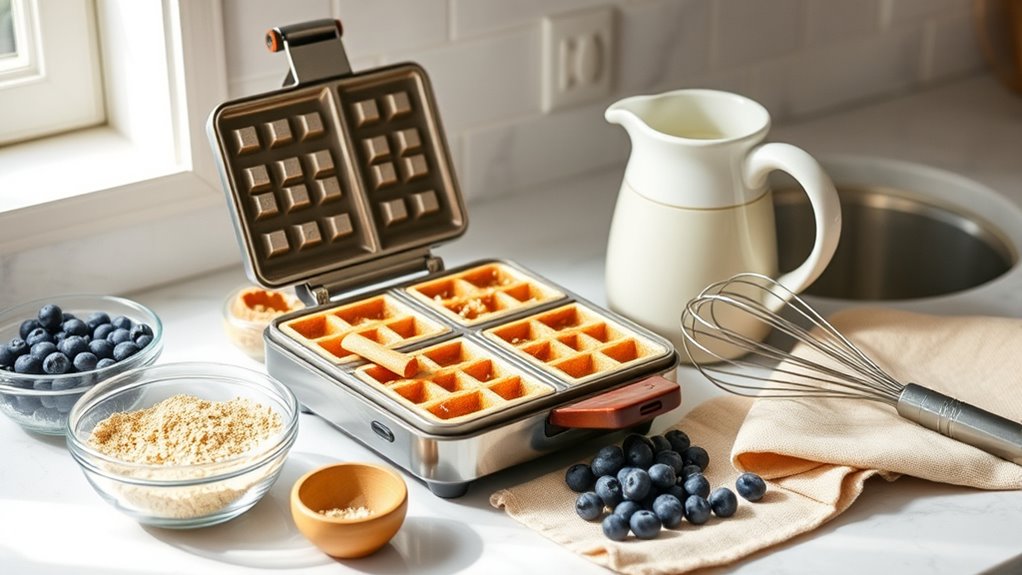
Essential kitchen tools make all the difference when crafting perfect whole grain waffles. To guarantee consistency and ease, you’ll need a reliable waffle iron and accurate measuring cups. These tools help maintain the right batter texture and cooking time, vital for achieving that ideal crispness and fluffiness.
Here’s a quick look at the necessary tools:
| Tool | Purpose | Tip |
|---|---|---|
| Waffle Iron | Cooks waffles evenly | Preheat fully |
| Measuring Cups | Measures ingredients precisely | Use for dry & wet |
| Mixing Bowl | Combines ingredients | Choose non-reactive |
Having these on hand frees you to focus on flavor and texture, giving you control over your waffle-making experience.
How to Cook
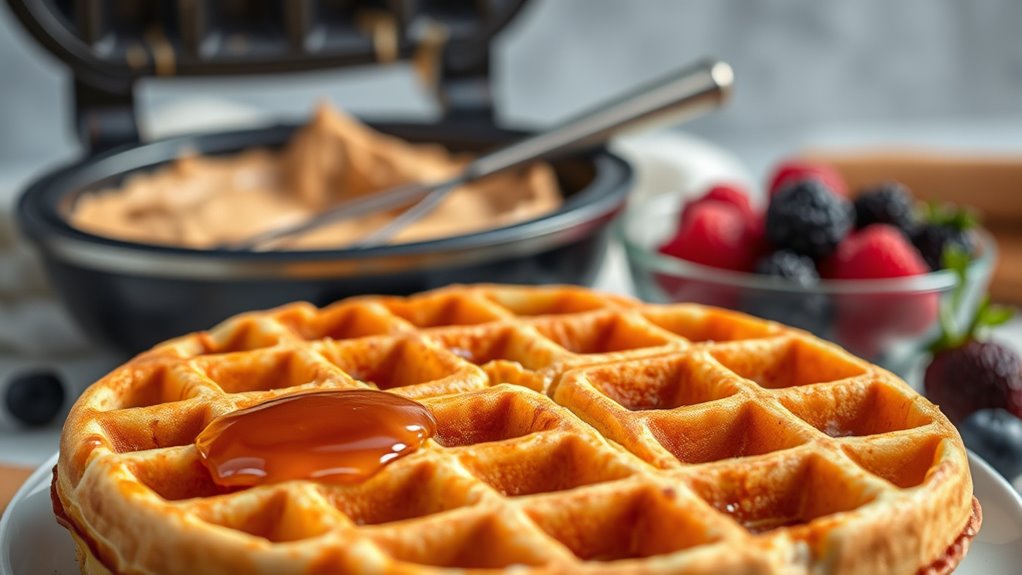
- Preheat your waffle iron fully to ensure even cooking and a crispy texture.
- Pour enough batter to cover the waffle grid without overflowing; avoid using too much batter to prevent uneven cooking.
- Cook the waffles until steam stops escaping, indicating they are cooked inside and crispy on the outside.
- Do not open the waffle iron prematurely to avoid splitting or sticking.
How to Serve
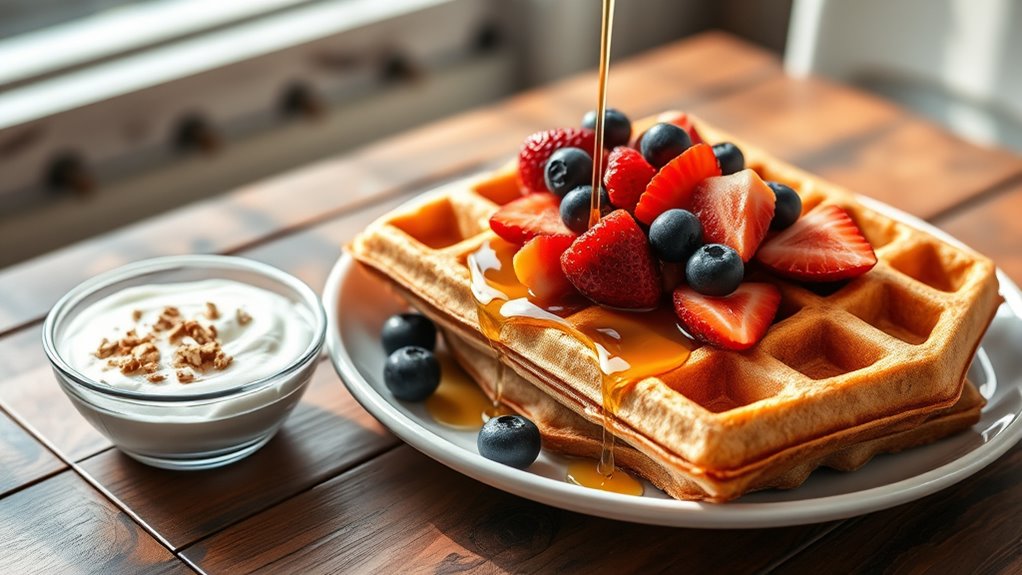
Although whole grain waffles have a hearty texture and rich flavor on their own, how you serve them can greatly enhance your overall experience. You can explore diverse serving styles to suit your mood and dietary preferences. Classic topping suggestions include fresh berries, sliced bananas, and a drizzle of pure maple syrup for a naturally sweet finish. For a more indulgent option, consider nut butters or Greek yogurt paired with honey and nuts, which add protein and creaminess. Savory styles work well too—toppings like avocado, smoked salmon, or a poached egg provide balanced flavors. Serving your waffles with a side of fresh fruit or a light salad can round out the meal. By choosing thoughtful topping suggestions and serving styles, you’ll enjoy both nutrition and freedom in your breakfast choices.
Tips
When making whole grain waffles, paying attention to batter consistency can make a significant difference in texture and cooking time. You want a batter that’s thick enough to hold shape but fluid enough to spread evenly. Here are some practical tips to help you master your waffles:
- Use a non-stick waffle iron and preheat it fully for even cooking.
- Avoid overmixing the batter to keep waffles tender, not dense.
- Experiment with waffle toppings like fresh fruit or nut butter for added flavor.
- Let cooked waffles rest on a wire rack to prevent sogginess.
These cooking techniques guarantee your waffles come out crispy outside and fluffy inside, giving you freedom to customize while maintaining perfect texture every time.
Food Value and Benefit
Prepared whole grain waffles offer significant nutritional value as they are made from unrefined grains, retaining more fiber, vitamins, and minerals compared to waffles made from refined flour.
Benefits of eating whole grain waffles include:
- Improved digestion due to high dietary fiber content
- Sustained energy release for longer-lasting fullness and stamina
- Better regulation of blood sugar levels, supporting metabolic health
- Enhanced gut health by promoting beneficial gut bacteria
- Contribution to overall well-being through essential nutrient intake
This recipe contains important vitamins and minerals such as:
- B vitamins (including B1, B2, B3, and folate) which aid in energy metabolism and brain function
- Iron, which supports oxygen transport in the blood
- Magnesium, important for muscle and nerve function
Frequently Asked Questions
Can I Substitute Whole Grain Flour With Gluten-Free Flour?
You absolutely can substitute whole grain flour with gluten-free options, but remember, it’s like swapping a sturdy oak for a flexible vine—the texture of the flour changes the waffle’s structure. Gluten-free flours often lack the elasticity of whole grain flour, so you might need to adjust liquid amounts or add binders like xanthan gum for the best results. Experimenting lets you enjoy freedom while crafting waffles that suit your dietary needs perfectly.
How Long Can Whole Grain Waffles Be Stored in the Freezer?
You can keep whole grain waffles in the freezer for up to 2-3 months without losing waffle freshness. For best results, let them cool completely before freezing, then store them in an airtight container or freezer bag to prevent freezer storage damage. When you’re ready, just toast or microwave them straight from the freezer. This way, you’ll enjoy convenient, fresh-tasting waffles anytime without sacrificing quality or flavor.
What Is the Best Way to Reheat Leftover Waffles?
The best way to reheat leftover waffles depends on your time and texture preference. The toaster technique is ideal if you want crispy edges—it revives the crunch without drying them out. If you’re in a hurry, the microwave method works well; just heat for 20-30 seconds, but waffles might get a bit softer. For freedom and convenience, you might even combine both: microwave briefly, then toast for crispiness.
Are Whole Grain Waffles Suitable for a Low-Carb Diet?
You might think whole grain waffles are off-limits on a low-carb diet due to their carbohydrate content, but they can fit if you watch portions. Whole grains do contain carbs, but they offer fiber, which slows digestion and lessens blood sugar spikes. For strict low-carb alternatives, consider almond or coconut flour waffles. These options help you enjoy waffles without sacrificing your freedom to control carb intake effectively.
Can I Add Fruits or Nuts Directly Into the Waffle Batter?
Yes, you can add fruits or nuts directly into the waffle batter to enhance flavor and texture. Consider fruit combinations like blueberries and bananas or chopped apples. For nut varieties, try walnuts, pecans, or almonds for a satisfying crunch. Just be mindful of moisture content and chopping sizes to maintain batter consistency. This approach lets you enjoy creative freedom while ensuring your waffles cook evenly and taste delicious.
References
- https://www.nutrition.gov/topics/wholesome-grains
- https://www.choosemyplate.gov/eathealthy/grains
- https://www.fs.usda.gov/wildflowers/ethics/planting.shtml
- https://www.ncbi.nlm.nih.gov/pmc/articles/PMC5372986/
- https://www.wholegrainscouncil.org/whole-grains-101/what-are-whole-grains
- https://www.healthline.com/nutrition/whole-grains-benefits
- https://www.eatright.org/health/wellness/preventing-illness/whole-grains-what-are-they-and-why-are-they-good-for-you
- https://www.jhsph.edu/research/centers-and-institutes/johns-hopkins-center-for-nutrition-and-food-security/whole-grains.html
